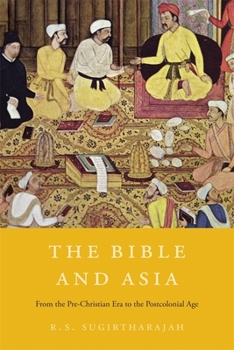The Bible and Asia: From the Pre-Christian Era to the Postcolonial Age
Though the Bible is a product of West Asia, its influence on Europe and the Americas has received far more attention than its complex career in the East. R. S. Sugirtharajah corrects this imbalance with an expansive new study of Asia's subversive and idiosyncratic relationship with the Bible. This is the story of missionaries, imperialists, exegetes, reformers, and nationalists who molded Biblical texts according to their own needs in order to influence religion, politics, and daily life from India to China.
When the Bible reached east and south Asia in the third century CE, its Christian scriptures already bore traces of Asian commodities and Indian moral stories. In China, the Bible merged with the teachings of Buddha and Lao Tzu to produce the Jesus Sutras. As he recounts the history of how Christianity was influenced by other Asian religions, Sugirtharajah deftly highlights the controversial issue of Buddhist and Vedic influence on Biblical religion. Once used to justify European rule in Asia, the Bible has also served to promote the spiritual salvation of women, outcasts, and untouchables. The Bible has left a literary mark on Asia in two ways: through its influence on Asian writers and through the reinvigoration of modern Asian vernaculars when proselytizing missionaries introduced Western print culture to the East.Format:Hardcover
Language:English
ISBN:0674049071
ISBN13:9780674049079
Release Date:November 2013
Publisher:Harvard University Press
Length:320 Pages
Weight:1.05 lbs.
Dimensions:1.1" x 5.8" x 8.5"
Customer Reviews
0 rating





